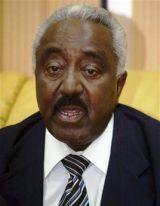Sudan rejects ICC war-crime allegations against two Sudanese
Feb 27, 2007 (KHARTOUM) — Sudan’s justice minister rejected on Tuesday the International Criminal Court’s allegations against a current minister of state and a militia leader accused of war crimes in Darfur, saying they would not be handed over for trial.

“We are not concerned with, nor do we accept, what the International Criminal Court prosecutor has opted for,” Justice Minister Mohamed Ali al-Mardi told The Associated Press.
“Our position (on handing over any indictees) remains the same,” Al-Mardi said.
Sudan has repeatedly said it will not respect any indictments handed down by the ICC, based in The Hague, Netherlands, as it is not a signatory to the convention that created the international court.
Earlier Tuesday, Moreno-Ocampo announced in The Hague that Harun — formerly a junior interior minister responsible for the western Darfur region and now minister of state for humanitarian affairs, also a junior position — and a janjaweed leader, Ali Mohammed Ali Abd-al-Rahman, also known as Ali Kushayb, were suspected of a total of 51 counts of war crimes and crimes against humanity.
The counts refer to the government’s campaign against rebels in the west Sudanese region of Darfur, where more than 200,000 people have died and more than 2.5 million people have been displaced in four years of fighting.
Harun was not available for comment Tuesday. A member of the family at his home said he was out of Sudan and expected to return Wednesday.
Al-Mardi, the justice minister, was quoted later Tuesday by the state SUNA news agency as saying that Harun had earlier been questioned about Darfur allegations but that “it was clear … he was not involved” in any incident.
Trained as a lawyer, Harun is regarded as one of the rising stars of the ruling National Congress Party. At one time he was the youngest minister of state in the government. He was selected for what were seen as difficult tasks because of his diligence and legal training. He hails from the Bargo tribe in western Sudan.
Moreno-Ocampo said Sudanese investigators had told him Kushayb was a “police assistant” who was under arrest while being investigated for the deaths of hundreds of people. But Sudan had not filed charges against him, Moreno-Ocampo said.
Al-Mardi also later said that Kushayb was in fact a member of Sudan’s regular forces, but did not specify whether he was police or military. Kushayb is “not a janjaweed but a member of regular forces and is currently under arrest in crimes related to violation of humanitarian and criminal laws, ” al-Mardi said.
The ICC prosecution presented a document to the court that alleges Harun and Kushayb were responsible for massacres, mass rapes and the forcible transfer of thousands of civilians from their homes.
The document established a clear link between the Sudanese authorities and the janjaweed.
Stephen Morrison of the Washington think-tank, the Center for Strategic and International Studies, said it repudiated the Sudan government’s long-held claim that it does not back the janjaweed.
“The charges detailed … systematically and consciously demonstrate the operational and policy linkage between the government and the janjaweed,” Morrison told The Associated Press in Cairo. “That is the core point, and it is important.”
The government denies backing the janjaweed, but members of the militia have told the media that they were armed by the state. And U.N. and African Union officials have said the government armed the janjaweed and directed its operations.
The Darfur conflict erupted in February 2003 when ethnic African tribesmen took up arms, complaining of decades of neglect and discrimination by the Khartoum government. The government retaliated with a counter-insurgency operation in which the janjaweed played a major role.
Meanwhile, a British expert on Sudan, Alex De Waal, said the ICC prosecutor had made a “nicely judged” move, as Harun and Kushayb were “not-so-senior figures … who could be thrown to the wolves by Khartoum without too much political fallout.”
By naming the two Sudanese as suspects — rather than issuing arrest warrants for them — the ICC prosecutor appears to have given Sudanese President Omar al-Bashir “a small window” to act, said De Waal, who has written a book on the Darfur conflict and works at the Social Science Research Council in New York.
